The very fact that I didn’t hate Paul Feig’s Spy is, I guess, remarkable. Truthfully, I think Spy is a pretty good 90-minute spy spoof that just has the misfortune of running two hours. (That may be more symptomatic of the modern film comedy than of Spy in particular.) Whether by accident or design, Feig has reconfigured the formula used in previous Melissa McCarthy vehicles. Rather than have her barge into the movie in full gale-force crass vulgarity, Spy starts off by establishing her Susan Cooper as a believable and likable character. (Perhaps he saw how appealing she was in last year’s St. Vincent.) This is hardly re-inventing the wheel, but it goes a long way — so far as I’m concerned — toward fixing a central problem with her abrasive screen persona.
The film opens with a credible (if not especially distinguished) ersatz James Bond scene — only it’s not James Bond, it’s C.I.A. agent Bradley Fine (Jude Law). Fine has all the aplomb and self-assured sophistication of classic era Bond. He also has something Bond never did — an earpiece through which Agent Susan Cooper (McCarthy) can apprise him of the bad guys’ every move. This is the film’s central premise — that super agent Fine is really only super because of Susan, a perfectly credible field-trained agent who is saddled with a desk job not only because she’s a woman, but because she’s…well, not exactly a super model. But she doesn’t mind all that much because she’s in love with Fine, who, of course, is oblivious to the fact. (The film’s plotting is rarely, if ever, surprising, even when it probably is meant to be.) All this changes when Fine is murdered by Rayona Boyanov (Rose Byrne), the villainous daughter of the equally villainous Tihomir Boyanov (Raad Rawi), who Fine accidentally killed before he could learn the whereabouts of a compact nuclear bomb.
It’s this turn of events that propels the bulk of the film. Her anger even finds its way into her official report (with a term that suggests Feig has seen Blade Trinity). Plus, her logic, that she would be unrecognizable as a field agent, sells her reluctant boss (Allison Janney) on trying the idea — much to the ire of Agent Rick Ford (Jason Statham, whose over-the-top macho ineptitude may be the best thing about the movie). Here we see McCarthy come into her own — but without losing sight of the character she’s already established. It’s a much smoother ride than what we had in things like Identity Thief and The Heat (both 2013). Is it more hackneyed and traditional than the standard McCarthy vehicle? Not in any significant way. The previous approach worked on the basis of ultimately explaining/excusing her self-centered outrageousness, which is just as old hat in a different way. Frankly, the way Spy plays out and its sense of personal growth and empowerment make this is a step forward.
This isn’t to say I’m calling Spy a good movie. It’s too long for its own good, and way too predictable in terms of plotting. Feig’s ability to surprise never extends beyond random jokes (“There’s a mouse on my tits”) and the obligatory gross-out gags. (All our technology has brought us to the artistic height of CGI puke — and not even very convincing puke at that.) For that matter, while the lines seem clever enough during the movie, I can’t say they’re especially memorable. As much as I enjoyed Jason Statham’s various macho rants, I only remember his last line in the film (possibly because it is the last). What I freely concede is it makes McCarthy likable throughout. For a change she’s not the punchline. The punchline is how others perceive her. I like that — and I like the fact that I found it painless to sit through. Rated R for language throughout, violence and some sexual content including brief graphic nudity.



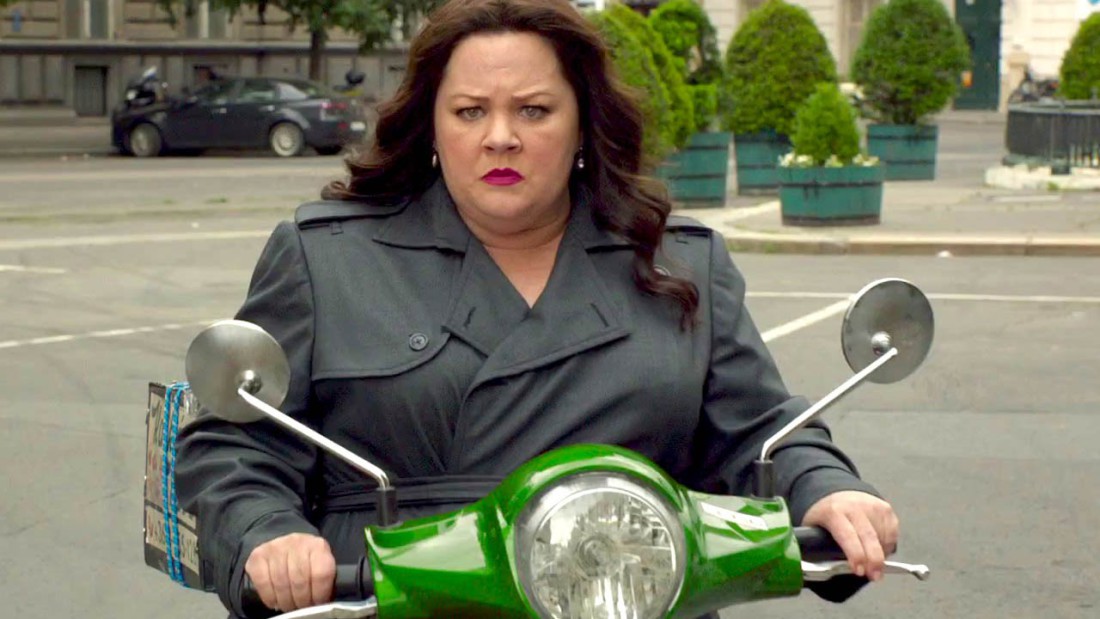
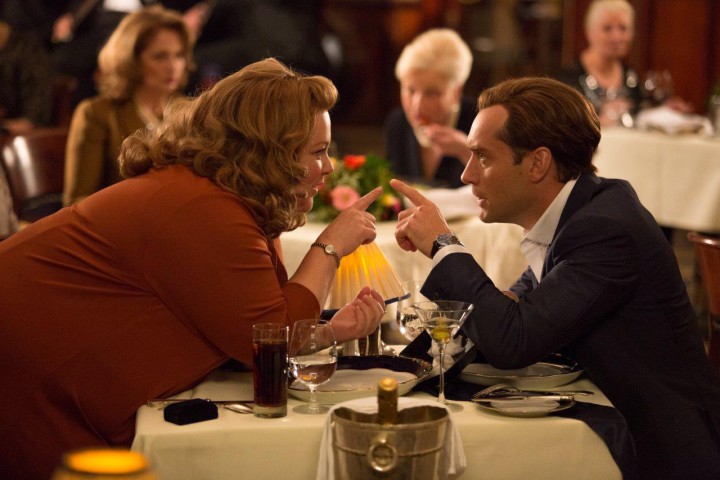
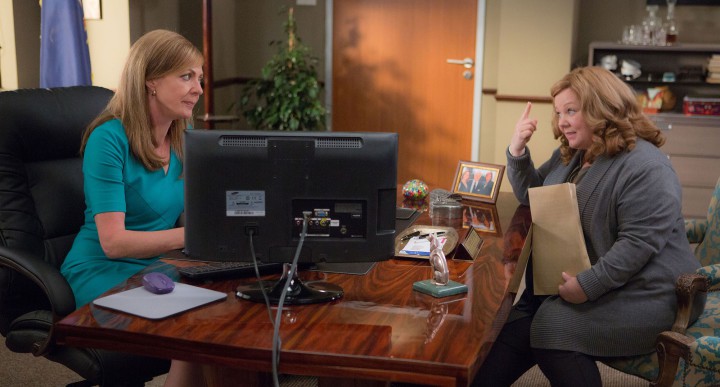
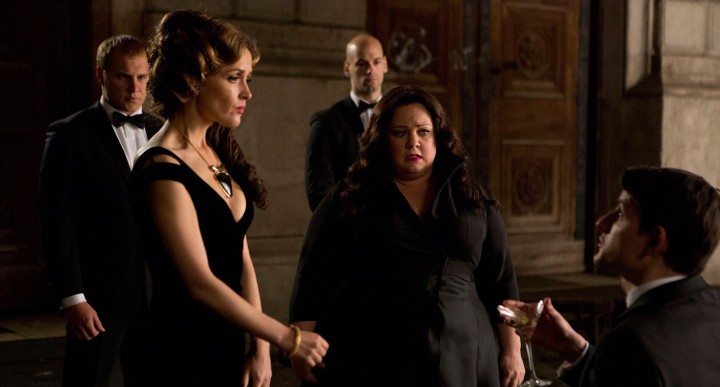
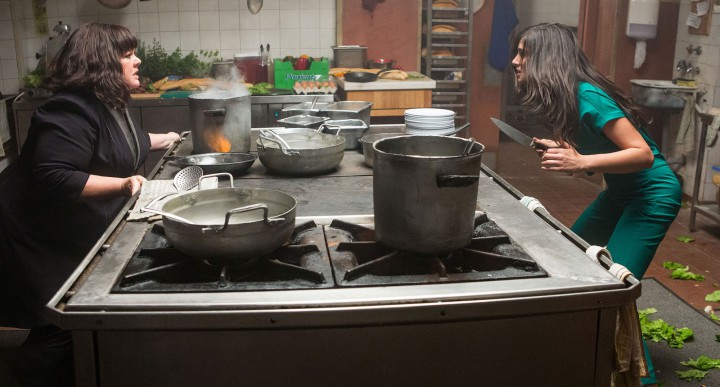
Rather than have her barge into the movie in full gale-force crass vulgarity, Spy starts off by establishing her Susan Cooper as a believable and likable character. (Perhaps he saw how appealing she was in last year’s St. Vincent.) This is hardly re-inventing the wheel, but it goes a long way — so far as I’m concerned — toward fixing a central problem with her abrasive screen persona.
I was so distracted by how hard everyone was trying – and, in my opinion, failing – to be funny that it’s only in retrospect that I’m fully noticing this encouraging shift.
Well, I don’t think I thought it was as unfunny as you did, which isn’t to say I thought it was a “laff riot” — except maybe next to The Heat or Identity Thief. In that company, it’s Duck Soup. Then again, as far noticing the change in approach, you probably didn’t think much about it afterwards, since you weren’t reviewing it.
I laughed once, which also would qualify it as Duck Soup among that competition.
No review of my own, but I’m working on an essay inspired by my reaction to Spy and have been reading a good number of reviews, many of which note the “character not caricature” beginning. When she goes into “bodyguard” mode, however, I think she reverts to her old ways and I liked it even less. That also happened to be the time when most of the theater started laughing even harder, so there’s clearly a market for that style.
A.) That’s what they paid to see. B.) There was nowhere for the movie to go if she didn’t go into that mode or a variant of it. (I would call this a variant.)
You had me at “There was nowhere for the movie to go.”
You only laughed once at Duck Soup, oh come on.
You misconstrued his meaning.
“I’m fat and I fall down. LOOK AT ME! LOOK AT ME!!!” Will someone please deport this woman and take Rebel Wilson with her.
She’s actually very good in St. Vincent. Rebel Wilson, on the other hand…
I was willing to tolerate her because I , like all Bill Murray fans, had to see it.
I don’t think she needed “tolerating” in St. Vincent.